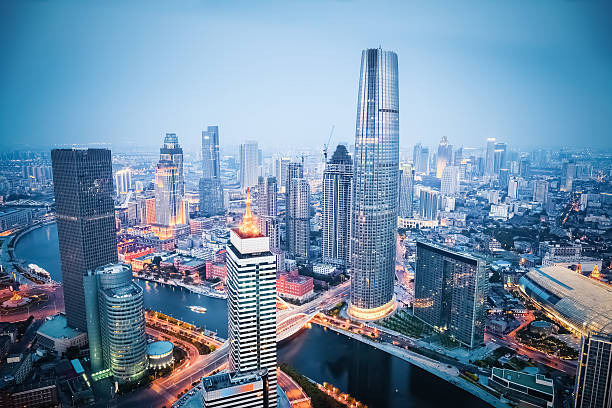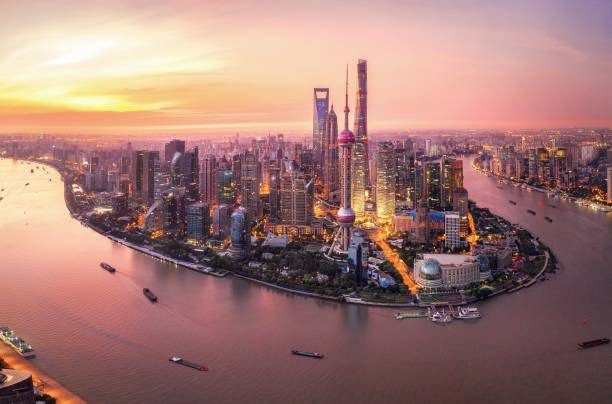When it comes to China, many people will think of a beautiful country with a rich history, along with a lot of cultural and spiritual values. That place is special with the Forbidden City, the Great Wall, busy and developed cities.
Today, this article will give you a new look at this vast country. It is a picture of a China with technology to be more modern, stronger, and brighter.
This article will cover 10 smart cities in China so you can understand more about this country and get more inspiration to experience a new China.
1. Zhuhai
Zhuhai City has made considerable efforts to become one of the model smart cities in the world’s most populous country. It has spent more than 1.4 billion yuan since 2017 promoting innovations in its top four industries:
- Artificial intelligence
- Semiconductors
- New materials
- Biomedicine
It also leverages tech giants, including Tencent, ZTE, and Huawei, to integrate more big data, technology, and AI into the real economy.
Zhuhai has also sought to effectively deploy digital infrastructure under a “smart brain” powered by next-generation artificial intelligence, blockchain technology, and big data.
The city also leads the way in internet access by ensuring that all significant islands and villages with more than 20 households have 4G and fiber optic network coverage.
2. Nanjing
Nanjing is the 11th largest city in China regarding Gross Domestic Product, with a favorable position to execute its intelligent infrastructure initiatives and investments.
This city has adopted a next-generation intelligent traffic system with radio frequency identification (RFID) chips and sensors to generate behavioral data, population mobility, road conditions, fares, area accessibility, etc.
It will update the data before sending it directly to the smartphone to reduce congestion.
3. Hangzhou
The city is famous for being the home of Alibaba, the e-commerce giant.
Since this city adopted City Brain, it has increased signal control by about 15%, resulting in a 3-minute reduction in travel time. Furthermore, emergency vehicles can also react about 50% faster.
The city deploys City Brain in multiple parking lots, favoring a “park first, pay later” system and allowing patients to get treatment and pay later at hospitals.
4. Shenzhen
Shenzhen is considered the Silicon Valley of China because of its outstanding development in technology and software. The city is also the birthplace of many tech giants like Tencent and Huawei.
The city has leveraged big data and AI technology in various fields, such as healthcare, social security, and transportation.
In addition, digital infrastructure can also help the city identify critical areas to allocate resources to where they are needed. As a result, it can effectively save governments and businesses billions of dollars each year.
5. Chongqing
Chongqing is not a geographically dominant city. However, it has not stopped making efforts in many areas related to smart city construction.
For example, by the end of 2017, about 120 industrial robot enterprises were present in this city with an output value of nearly 8 billion yuan, an increase of more than 30% compared to the same period last year.
It is the first 5G test site, strengthening its role in the country’s rapidly growing smart industry.
6. Guangzhou
This city has the most startups in China. It was also one of the earliest cities to adopt AI technologies and smart programming on government systems, from personal identification to weather forecasting.
Also, adopting a cloud data system allows government employees to easily access and use government resources to improve the efficiency of services.
Guangzhou is also deploying more than 80,000 5G base stations while promoting the development of a new energy automotive industry that can reduce carbon emissions.
7. Tianjin

This city has about 15 million people and is working with Singapore to build and develop an eco-city built on 30 square kilometers of reclaimed wetlands.
It will depend on geothermal and solar energy to produce electricity while using waste heat from a nearby power plant for heating.
Tianjin also uses technology for efficient waste collection, treatment, and segregation. Its smart bus stops and driverless public bus system also make commuting more convenient, which is helpful given the growing population.
8. Beijing
Beijing is the capital of China, where efforts are being made to significantly improve the convenience and efficiency of public services, from social security to transportation.
Beijing is also one of the cashless cities, allowing Beijingers to pay for all kinds of services through their smartphones.
The transportation system here is significantly improved thanks to a real-time simulated road network model, which allows the analysis of congestion points.
9. Shanghai
There is no denying that Shanghai is one of the leading smart cities in China, even in the world).
It has applied Citizen Cloud, a one-stop point for about 1,000 different services for citizens, including medical and health care, personal information, social security, transportation, community life, and leisure and tourism.
Residents can use it to store documents such as identity cards, marriage certificates, driving and business licenses, and residence permits.
The city also has more than 1,700 solar electronic station signs and 1,600 LCD screens set up throughout the city, providing public transport arrival times.
10. Chengdu
Regarding the top cities for the country’s digital economy, it would be remiss not to mention Chengdu, which pioneered gigabit network deployment.
Chengdu has adopted a cashless system widely but operates a little differently from other cities such as Hangzhou and Beijing.
Specifically, it implements “face payment,” which allows you to pay by scanning QR codes and facial recognition on your phone when purchasing services and goods in stores.
In addition, 5G networks and intelligent applications are becoming increasingly popular in this city, allowing it to effectively solve problems in education, transportation, employment, healthcare, and commercial services.
The Bottom Line
You have reached the bottom of this article. We have provided you with basic information about the top China’s smart cities.
Are you planning to visit any of these cities in the future? Please share with us through the comments section. Thank you for your interest in the article!













